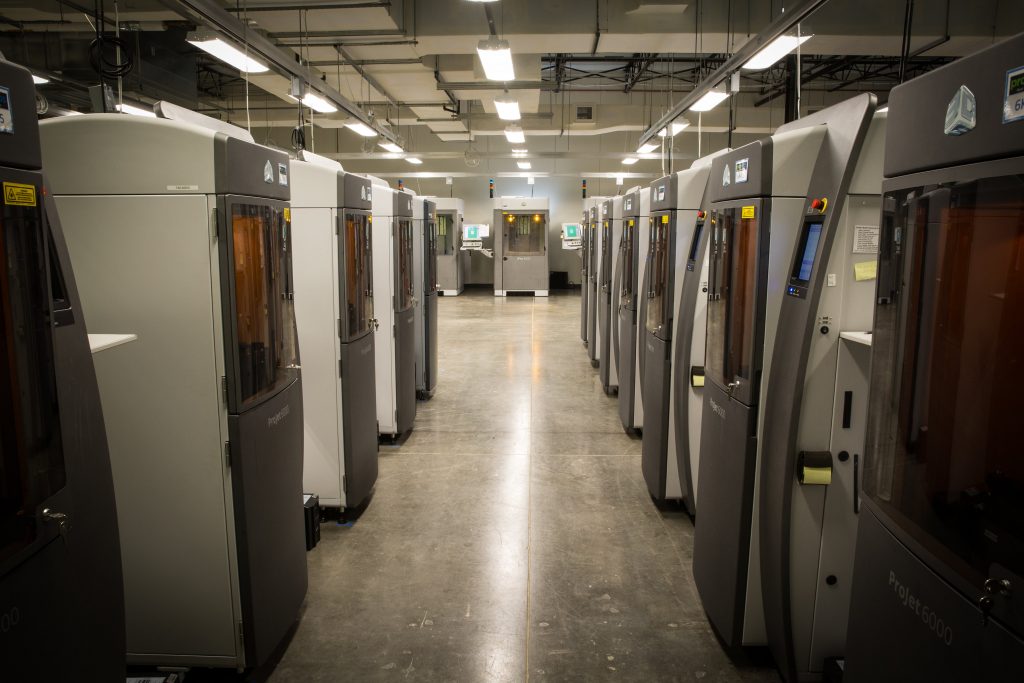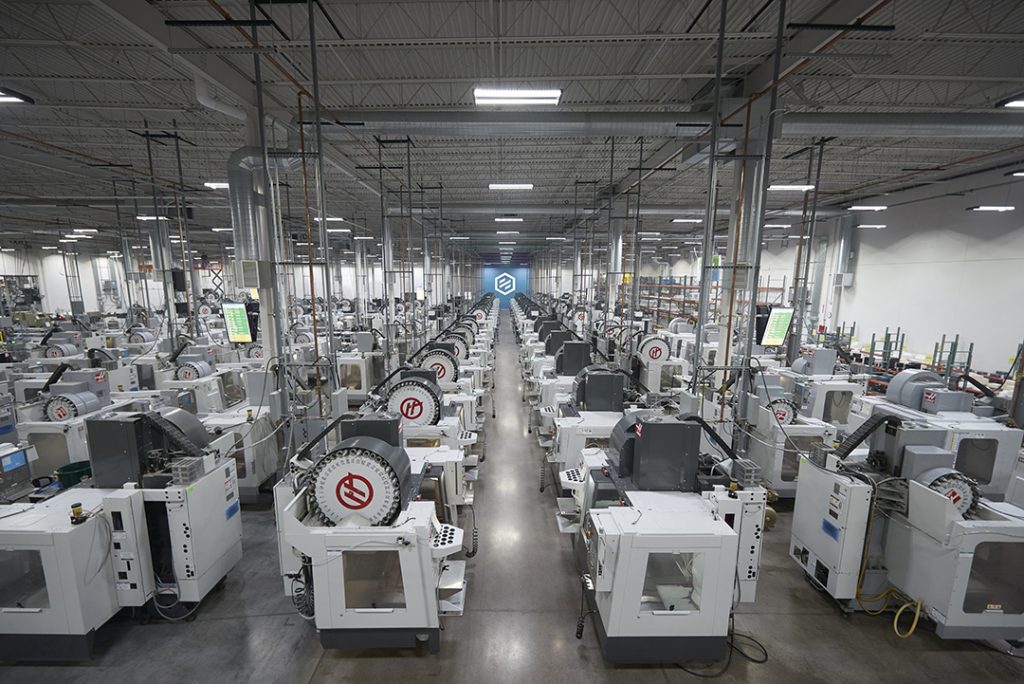Vicki Holt is the President and CEO of Minnesota-headquartered digital manufacturing provider Protolabs. With over three decades experience leading global materials businesses, Holt arrived at this role in 2014. Concurrent to Holt’s appointment, Protolabs launched its industrial-grade 3D printing services alongside other provisions in sheet metal fabrication, CNC machining, and injection molding. Continually growing its capabilities, Protolabs is reaching beyond its foundations as a rapid prototyping provider into end-use production, a move well reflected by the 3D printing industry.
Most recently, the company celebrated its 20th anniversary with the inauguration of its 12th global manufacturing plant. Across each of these locations, in North America, Europe and Japan, the company serves nearly 46,000 industrial customers, producing in excess of 40 million components each year. “Our mission,” explains Holt, “is to really help companies accelerate innovation, reduce risk and optimize their supply chain for the supply of high quality prototypes, and on demand manufacturing services.”
In an exclusive interview, 3D Printing Industry learns more about the driving force behind Protolabs and Holt’s visions for the future of manufacturing. “We can help entrepreneurs get their products to market, or we can even help large companies successfully compete by being able to commercialize and bring things to market and optimize their supply chain,” Holt adds.
“Our vision is a combination of the digital e-commerce experience, coupled with a very unique fulfillment experience, which allows us to digitally supply these custom parts at unprecedented speeds, and very cost effectively at low volumes.”
“It allows us to make a big difference in our customer’s lives and their experience with the ease of doing business with us – because it’s digital experience.”
Digital manufacturing and the pace of Industry 4.0
In the cyber-physical trend of Industry 4.0, manufacturers need to adopt digital processes in order to survive. Where many traditional businesses are grappling with the integration of Big Data and the Digital Twin, this is one area in which Holt believes Protolabs has a competitive edge. “We have the luxury in that we were invented as a digital manufacturer. Most companies out there, and most manufacturers, have to reinvent themselves, they already have an established operation in a different way.”
Through involvement with the National Association of Manufacturers and the Manufacturing Leadership Council Holt is also helping other businesses with digitization. “The opportunities for manufacturers are huge,” she adds, “And I will tell you, I believe we’re at the very beginning of this transformation.”
“We’ve got a long way still to go.”
As no one thing can be pinpointed as “the next big advance” for industry 4.0, Holt shares that the most important thing is to just “get started.” In this sense, she emphasises a solution-based approach, encouraging manufacturers to tackle operational or performance issues by leveraging relevant technologies. As a “technology agnostic” organization, Protolabs’ guidance in this instance is a particular strength. “We’re there to help engineers design the best products for what they’re trying to accomplish with the best manufacturing solution to meet their needs,” says Holt, “We don’t push them toward one solution or another – we really try to be very customer centric in what we do.”

Though seemingly a buzzword for many projects in the sector, sustainability is also an important preoccupation for Holt both on a personal level and in the management of Protolabs. Within the business itself, initiatives are in place to recycle scrap metals and plastics, including powders used in the 3D printing process. Fundamentally though, Holt believes that businesses are in the best position to tackle challenges like global climate change. “It’s going to be companies with technologies that they can deploy to produce energy to change how we manufacture, to take advantage of different approaches to agriculture for example,” Holt comments, “Those are the things that are going to solve these global climate change problems.”
“It’s not going to be a politician. And frankly, it isn’t going to be academia without collaboration with business.”
Overall, Holt explains, its up to businesses to implement technology in a valuable and meaningful way. “In the end,” she says, “We’ve got to deploy all of these technologies into the world in a way that allows society to continue to function in an orderly way, and to have things like shelter, food and warmth. That’s what manufacturers do.”
“We’re going to solve these problems,” she states, “The manufacturing community, I believe, is firmly committed to solving these problems.”

Moving beyond prototyping
As far as future directions are concerned at Protolabs, it seems that more expansion is what is currently on the cards. The speed of sheet metal services at Protolabs is now the fastest it’s ever been, due in part to the company’s acquisition of New Hampshire’s Rapid Manufacturing Group. “We can turnaround requests for our sheet metal offer in as little as three days, which in custom sheet metal businesses is just unprecedented,” Holt adds.
In 3D printing, the company is currently in the process of launching the high requirements direct metal laser sintering (DMLS) offering due to perceived customer requirements. “As companies want to use us more for production parts, the service we offer has to change a little bit,” explains Holt, the reason being that there is “usually quite a bit of upfront engineering that takes place to really finalize the part” for end use. “As we get these high requirements projects, we also have to work out quality control plans with the customer, and how we’re going to make sure that we can meet their needs for production part.”
Currently, all of Protolabs’ North American 3D printing orders are handled by a 77,000 square foot factory in Raleigh, North Carolina. Though presently not as large as its North American counterpart, Protolabs’ has two European 3D printing facilities located in Germany, just south of Munich. Within the next year or so, Holt explained that the company plans to merge these two sites to make more of a “showcase” additive manufacturing facility for the region.

Reporting another record quarter for 3D printing in its Q1 2019 earnings report, Holt says that Protolabs will continue to target “high-teen growth rate” in 3D printing throughout 2019 as this business “is actually growing faster than other services.” In general, across the full Protolabs service offering, Holt says the persistent goal for the year is to move “beyond just protoyping.”
“Our high requirements DMLS project is clearly one of those services that is helping to make sure we’re positioning ourselves to move beyond just prototyping, and we are doing similar things in every one of our services: injection molding and CNC machining, even sheet metal.”
Now, Holt concludes:
“We are much more than just prototyping solutions.”
For the second year in a row, Protolabs is the official sponsor and manufacturer of the 3D Printing Industry Awards trophy. Through working to build a 3D printed cranial implant with Novax SMA, the company has also been nominated by readers for the 2019 Medical Application of the Year.
For more exclusive interviews and news, subscribe to the 3D Printing Industry newsletter, follow us on Twitter and like us on Facebook. For new opportunities in your sector, search 3D Printing Jobs.
Featured image shows Vicki Holt, President and CEO of Protolabs. Photo via Protolabs.



